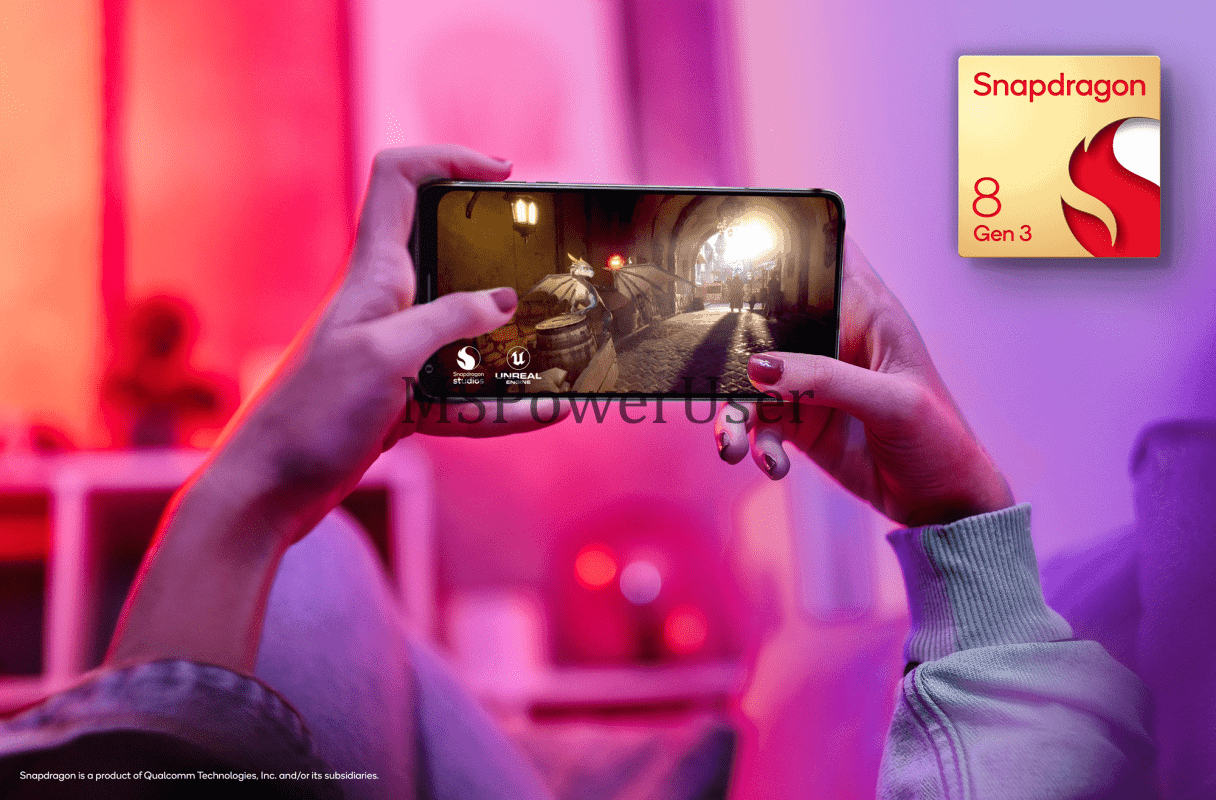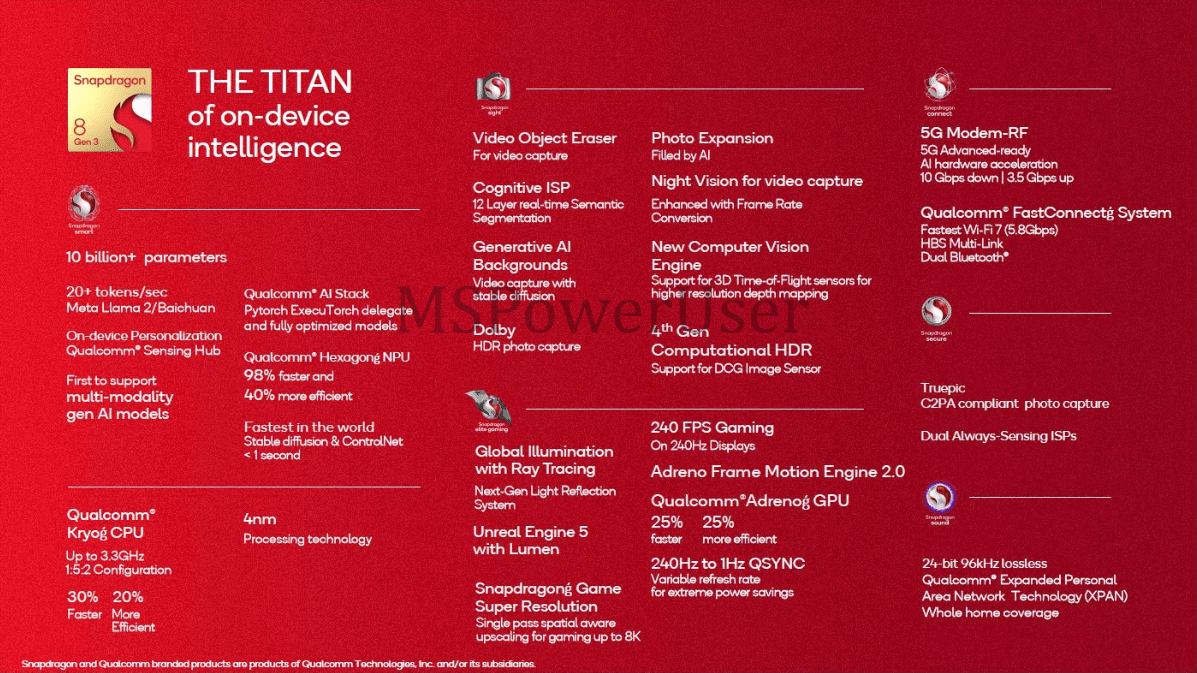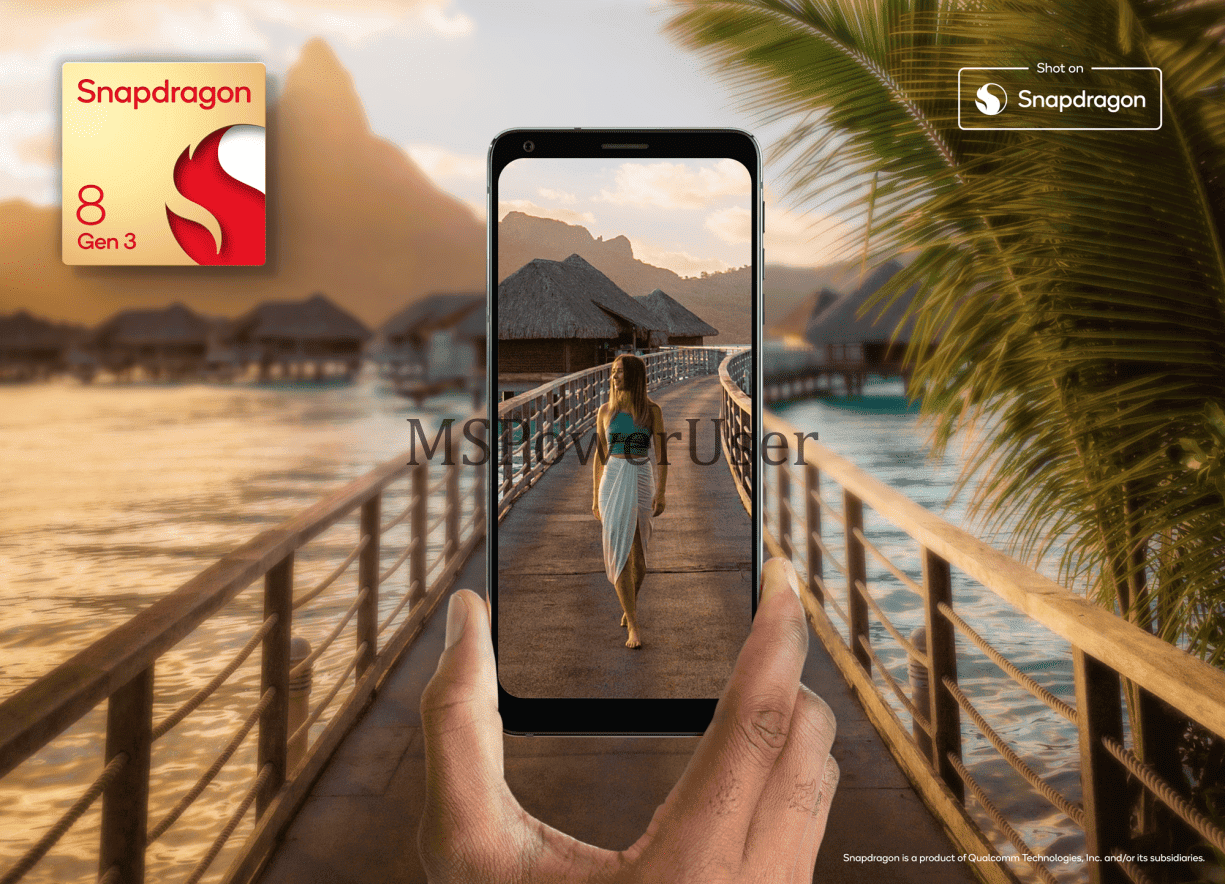Qualcomm will soon release its latest flagship mobile platform, the Snapdragon 8 Gen 3, which will enable generative AI on the next generation of flagship smartphones, as detailed in a leaked internal document that we obtained.
The tech maker boasts that the Snapdragon 8 Gen 3 — its debut in mobile platform designed specifically for generative AI — is the most powerful and versatile mobile platform on the market.

It’s perfect for users who want the best possible performance and features in their smartphone. The rumor’s still up in the air, but words on the streets say that we may potentially see the Snapdragon 8 Gen 3 powering the upcoming Samsung Galaxy S24 in February next year.
Or, Google may be ditching its ARM64-based Tensor for this.
One thing for sure is that the Snapdragon 8 Gen 3 will definitely challenge iPhone 15’s ray-tracing capability. The tech maker says that its “console-defying” and “premium level” Gen 3 has a ray tracing feature, brought to you by Unreal Engine 5.2, and can upscale cutscenes up to 8K.
Qualcomm Snapdragon 8 Gen 3’s full specification

Generative AI is a type of artificial intelligence that can create new content, such as text, code, images, and music. It is still a relatively new technology, but it has the potential to revolutionize many industries, including smartphones.
Not too long ago, leaked internal documents also revealed the company’s upcoming Snapdragon X Elite SoC for Windows PCs. It will reportedly feature 12 Oryon high-performance cores and Adrenu GPU that can deliver 4.6 TFLOPS with triple 4K display support.
Take a peep at Qualcomm Snapdragon 8 Gen 3 full specifications below.
| Artificial Intelligence |
Qualcomm® AI Engine • Qualcomm® Adreno™ GPU • Qualcomm® Kryo™ CPU • Qualcomm® Hexagon™ NPU • Fused AI accelerator architecture • Hexagon scalar, vector, and tensor accelerators • Hexagon Direct Link • Upgraded Micro Tile Inferencing • Upgraded power delivery system • Support for mix precision (INT8+INT16) • Support for all precisions (INT4, INT8, INT16, FP16)Qualcomm® Sensing Hub • Dual micro NPUs for audio and sensors • Dual Always-Sensing ISPs to support two concurrent Always-Sensing Cameras • Support for INT4 precision |
| CPU |
Qualcomm® Kyro™ CPU • 64-bit Architecture • 1 Prime core, up to 3.3 GHz • 5 Performance cores, up to 3.2 GHz • 2 Efficiency cores, up to 2.3 GHz |
| Visual Subsystem |
Adreno GPU • Real-time Hardware-Accelerated Ray Tracing with Global Illumination • Support for Unreal Engine 5 Lumen Global Illumination and Reflections System • Snapdragon Game Super Resolution • Adreno Frame Motion Engine 2.0 • Snapdragon Game Post Processing Accelerator • HDR gaming (10-bit colour depth, Rec. 2020 colour gamut) • Snapdragon Shadow Denoiser • API support: OpenGL® ES 3.2, OpenCL™ 2.0 FP, Vulkan® 1.3 • Hardware-accelerated H.265, VP9, AV1 decoder • HDR Playback Codec support for HDR10+, HDR10, HLG, and Dolby Vision |
| 5G Modem-RF System | Snapdragon® X75 5G Modem-RF System |
| Memory |
• Memory Density: Up to 24 GB • Support for LP-DDR5x memory, up to 4800 MHz |
| Wi-Fi & Bluetooth |
Qualcomm® FastConnect™ 7800 System • Wi-Fi Generation: Wi-Fi 7 • Peak Speed: 5.8 Gbps • 802.11be, 802.11ax, 802.11ac, 802.11a/b/g/n • Wi-Fi Spectral Bands: 6 Ghz, 5 GHz, 2.4 GHz • Channel Bandwidth: 320/240/160/80/40/20 MHz • 8-stream sounding (for 8×8 MU-MIMO) • MIMO Configuration: 2×2 (2-stream) • MU-MIMO (Uplink & Downlink) • 4K QAM • OFDMA (Uplink & Downlink) • High Band Simultaneous (HBS) Multi-Link • Wi-Fi Security: WPA3-Enterprise, WPA3-Enhanced Open, WPA3 Easy Connect, WPA3-Personal Integrated Bluetooth • Bluetooth Audio: Snapdragon Sound™ Technology with support for Qualcomm XPAN Technology, Qualcomm® aptX™ Voice, aptX Lossless, aptX Adaptive, and LE Audio • Bluetooth Features: Bluetooth 5.4, LE Audio, Dual Bluetooth antennas |
| Display |
On-Device Display Support: • 4K @ 60 Hz • QHD+ @ 144 Hz Maximum External Display Support: • Up to 8K @ 30 Hz • Up to 1080 @ 240 Hz Variable Refresh Rate support for 240 Hz to 1 Hz • 10-bit colour depth, Rec. 2020 colour gamut • HDR10, HDR10+, HDR vivid, and Dolby Vision |
| Audio |
• Qualcomm Aqstic™ audio codec • Qualcomm Aqstic smart speaker amplifier • Total Harmonic Distortion + Noise (THD+N) • Playback: -108dB • Qualcomm® Audio and Voice Communication Suite • Spatial audio with head-tracking |
| Camera |
Qualcomm Spectra™ Image Signal Processor • Cognitive ISP, Triple 18-bit ISPs • Up to 36 MP triple camera @ 30 FPS with Zero Shutter Lag Up to 64+36 MP dual camera @ 30 FPS with Zero Shutter Lag • Up to 108 MP single camera @ 30 FPS with Zero Shutter Lag • 8K HDR video capture + 64 MP photo capture @ 30 FPS 4K video capture @ 120 FPS |
| USB | Version 3.1 Gen 2; USB Type-C Support |
Will the Snapdragon 8 Gen 3 be the next best thing?

To call this the next best thing is not too much of a reach: competitors like Apple and Samsung have been doing this closed ecosystem practice, respectively with the Airdrop file-sharing feature and the Galaxy Connect service, for so long.
This is similar to an open source experience, because it is open to all manufacturers and it allows them to create their own custom solutions.
So, when the Snapdragon 8 Gen 3 hit the market, smaller manufacturers that choose the chip to power their machines can potentially and easily create integrated experiences for their users across different devices.
Who knows? Only time will tell. In the meantime, do share your thoughts on this below!



3175x175(CURRENT).thumb.jpg.b05acc060982b36f5891ba728e6d953c.jpg)
Recommended Comments
There are no comments to display.
Join the conversation
You can post now and register later. If you have an account, sign in now to post with your account.
Note: Your post will require moderator approval before it will be visible.